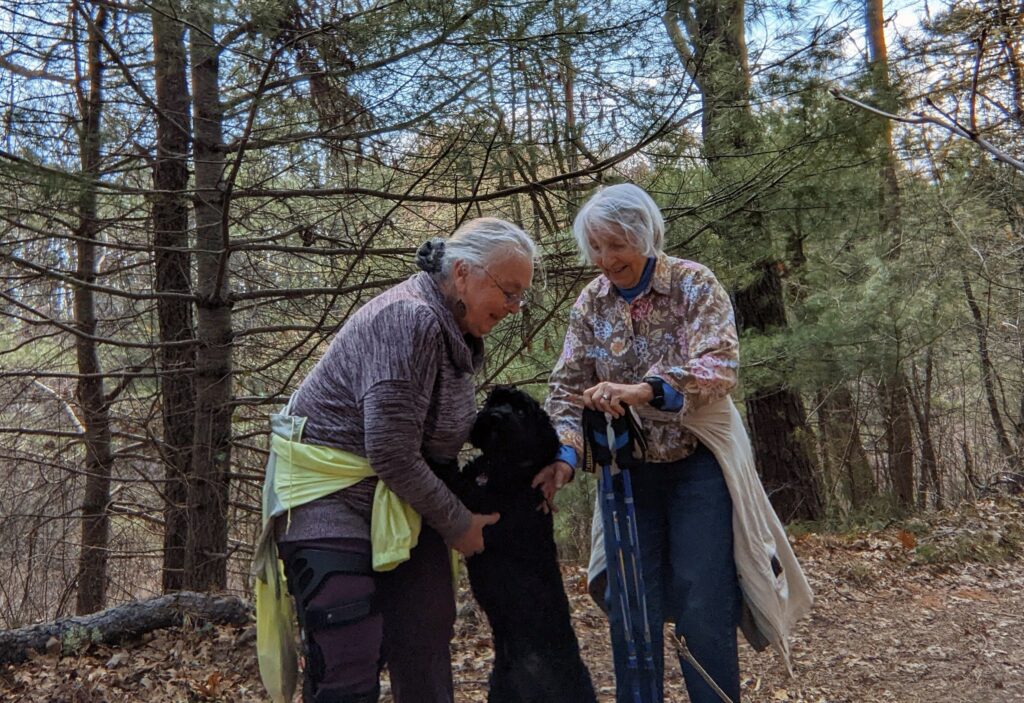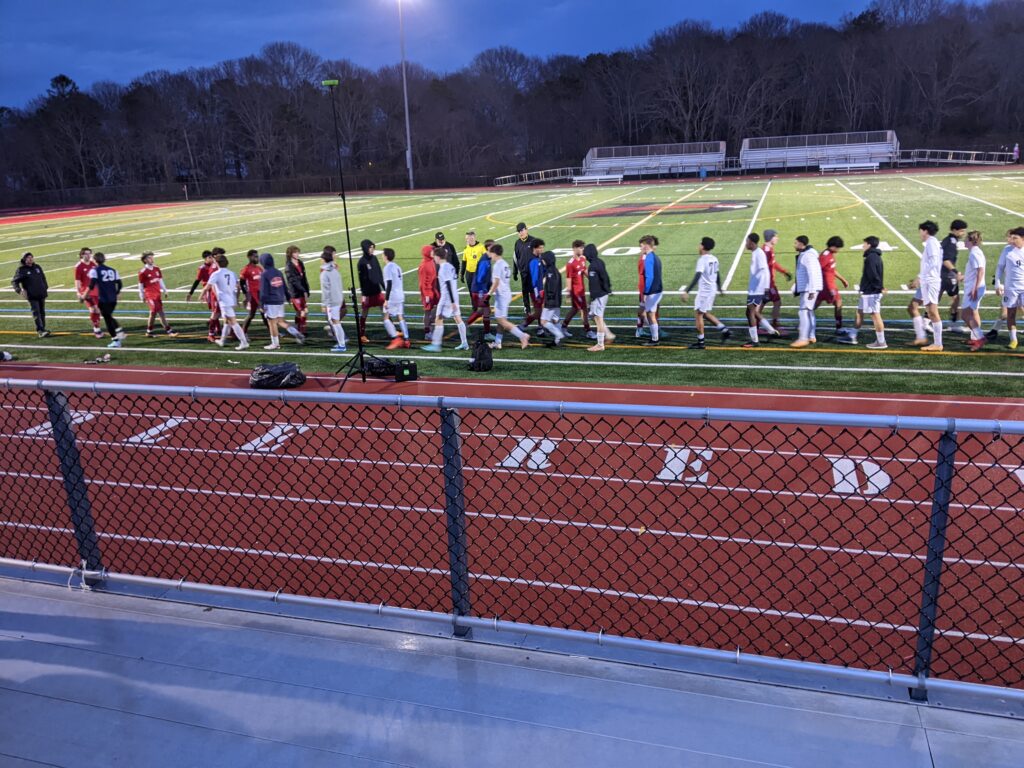

After almost 6 years of traveling, we sailed into Woods Hole on Cape Cod. We continued living aboard for the next five years and I wrote about that, adding ‘and Beyond’ to the title of the blog. Then shortly before Mark’s death in 2016, we sold our beloved Windbird and my travel logs became land logs. At this point, I had written a daily account for each and every day for 11 years. I fully intended to end the blog at that point, but when I wrote that news in a log, I got many responses saying that I really needed to keep posting. At the same time, I realized that I couldn’t stop writing. Summarizing each day had become a permanent part of my life and I will probably continue writing until I can no longer. These postings reflect the ordinary, and sometimes the extraordinary, days in my life and I would like to invite you to join me on my journey.
2024 Life Logs, Day 108: Meeting Day
2024 Life Logs, Day 108: Meeting Day
Date: Wednesday, April 17, 2024
Weather: Partly Sunny, Cloudy Late; High Temp 50, Low 43 degrees F
Location: At Home on Lakeview Avenue, Falmouth, MA
This morning was the monthly Encore General Meeting. The speaker was the historian from the Cape Cod Baseball League. I am not a baseball fan, but he was an engaging speaker. The best college baseball players from around the US come here every summer to play on the Cape’s 10 teams. The League was formed in 1885 and it is still going strong.
I came home for a couple of hours and spent most of that time baking and walking with Shadow. Then it was back out for an afternoon Exploring Public Policy meeting. Today the President of the Chamber of Commerce, Michael Kasparian, came to give us an update on the housing crises in Falmouth. We have lots of houses, but they are financially out of reach for most middle income families. It was an information-packed meeting and most of us left realizing we know so very little about our town system of government. Lots to learn.
2024 Life Logs, Day 107: Taco Tuesday
2024 Life Logs, Day 107: Taco Tuesday
Date: Tuesday, April 16, 2024
Weather: Sunny and Warm; High Temp 61, Low 43 degrees F
Location: At Home on Lakeview Avenue, Falmouth, MA
By the time I got up, walked a mile with Shadow, took a shower and got dressed, it was time to drive to Falmouth Hospital for my physical therapy session. Last week I was told I was doing so well that I really didn’t need to continue. But today when I asked for clarification, Matt said that I will continue until one week prior to my knee surgery. He did say I really didn’t need to continue, but that didn’t mean he could release me early. I am happy about that as I feel my back is just now starting to feel a bit stronger. He gave me quite a workout today and gave me the go ahead to continue to work on my gardening projects, adapting the way I do things. He strongly recommended that I purchase a garden seat of some sort on wheels.
I went directly from PT to Añejo on Main Street for a Taco Tuesday lunch with friend Kate Eldred. I haven’t seen Kate since early November, and she had no idea I had back surgery since our last meeting. We had a great lunch and caught up on happenings in our lives. Then I was off to post campaign flyers on community bulletin boards for Heather. I drove to North Falmouth to start there and learned a lot as I went along. Some of the bulletin boards are outside, so I need to put those flyers in a plastic sleeve. This activity will continue Thursday afternoon. Tomorrow is a jam-packed day with a morning Encore meeting, an afternoon Exploring Public Policy meeting, and cooking to do for a luncheon on Thursday. I did get to spend some of the beautiful afternoon outside with Shadow, but there was no time to continue my gardening projects. Maybe Friday for that.
This week is spring break, and Heather and family left this morning for their mini-vacation. Today they visited a military museum in Worcester. Heather sent a photo of the boys standing beside a piece of the Berlin Wall.
Then they headed to Boston where they will spend the night. The plan was to have dinner at one of the boys’ favorite restaurants, Fire and Ice and then tomorrow have Boston Crème Pie at the Omni Parker. Heather and Sam will do a Tufts University tour and Jed will take Jonah and Ollie to the Museum of Science. They plan to be home by dinner time tomorrow night.
2024 Life Logs, Day 106: 100 Years Ago Today
2024 Life Logs, Day 106: 100 Years Ago Today
Date: Monday, April 15, 2024
Weather: Mostly Sunny and Warm; High Temp 63, Low 45 degrees F
Location: At Home on Lakeview Avenue, Falmouth, MA
One hundred years ago on Tuesday, April 15, 1924, my parents, Ollie Lillian Biggs and Hayes Winfred Martin were married. I always think of them on this day. Today was another special day here in Massachusetts. On the third Monday in April, Massachusetts celebrates Patriots’ Day. This commemorates the start of the American Revolution with the battles of Lexington and Concord. Years after that battle, Ralph Waldo Emerson penned the phrase, the “shot heard round the world” because he felt that the American Revolution had world-wide importance.
Today was special to me because it was the warmest day we have had this spring. I love warm weather, so I truly enjoyed this day. Olga Mitchell and I walked a mile and a half on the Quashnet River Trail, a favorite for both of us. We started out wearing light jackets, but it was so warm we had to take them off and tie them around our waists. Shadow was with us, and since there was no one else on the trail, I let him off leash for most of the walk. He enjoyed that freedom but stayed right beside me every step of the way.
Shadow was with us, and since there was no one else on the trail, I let him off leash for most of the walk. He enjoyed that freedom but stayed right beside me every step of the way.
At home this afternoon, I practiced “stand up” gardening. Trying to limit bending is a true challenge for a gardener. It is easy while I planted seeds in the elevated raised bed the Goldstones gave me for my birthday, but cleaning up the ground level raised beds is going to be more of a challenge. I saved that for tomorrow. The seedlings I started a few weeks ago indoors need to be transplanted into larger containers. I turned an old table that sits at the edge of woods beside my house into a planting table so I can stand up straight to do that job tomorrow.
Tonight, I spent time watching the commentary on the first day of the Trump “hush money” trial while I ate dinner and rode my exercise bike. I woke up with a hurting knee this morning, but it feels better after riding the bike. So, tomorrow I am going to start my day on the bike hoping it will take away the pain for the rest of the day.
2024 Life Logs, Day 105: Sam’s Soccer Game
2024 Life Logs, Day 105: Sam’s Soccer Game
Date: Sunday, April 14, 2024
Weather: Mostly Cloudy, Windy, Rain PM; High Temp 52, Low 47 degrees F
Location: At Home on Lakeview Avenue, Falmouth, MA
I’m really hoping that the weather forecast for tomorrow is correct. Partly sunny, very little wind, no rain, and a high temp of 63 degrees F. It would be better if we were to have full sun, but I’ll take any amount of sun without the wind that has been so prevalent of late.
I was not particularly productive today, but it was good to have a laid back day. Late afternoon, Heather and I went with Sam to his soccer game in Hyannis. There was a cold light rain for much of the second half, but we won 2-1, so Sam,number 21, was happy and said he didn’t even notice the rain.
He got a hard hit on his elbow in the last quarter, but he is hoping it is just a bone bruise. We got home a little before 9 pm. Sam loves the late Sunday games, but Heather and I are not in agreement with him on that. But there is no school this week, spring break, so doesn’t have to get up at 6 am to go to school.
2024 Life Logs, Day 104: To Martha’s Vineyard for Ollie’s Soccer Game
2024 Life Logs, Day 104: To Martha’s Vineyard for Ollie’s Soccer Game
Date: Saturday, April 13, 2024
Weather: Partly Sunny, Super Windy; High Temp 52, Low 44 degrees F
Location: At Home on Lakeview Avenue, Falmouth, MA
Jed, Ollie, and I met up with Ollie’s soccer team to take the 9:30 am ferry to Martha’s Vineyard. This was their first game of the season and they won 4-2. There are enough kids on the team to have two teams, but there aren’t enough coaches. Ollie, number 23 wearing his bright yellow cleats, really gave it his all today.

Unfortunately, near the end of the game, he ended up getting hit in the left eye by another player’s hand (an accident, not intentional we hope). The coaches put an ice pack on it right away, but he might wake up tomorrow morning with a black eye. The team should have played at least one game prior to today, but rain has cancelled practices and at least one game so far. There was no rain on Martha’s Vineyard today, but the wind was blowing about 25 mph. Jonah had a soccer game at the high school this afternoon, but we got back too late to go to that. And evidently it rained a little here. Jonah has another game tomorrow morning off Cape and Sam has a game in Hyannis tomorrow late afternoon. Tis the spring soccer season!
2024 Life Logs, Day 103: Nasty Weathe
2024 Life Logs, Day 103: Nasty Weather
Date: Friday, April 12, 2024
Weather: Overcast, Rain, Windy; High Temp 57, Low 46 degrees F
Location: At Home on Lakeview Avenue, Falmouth, MA
Today’s nasty weather was caused by strong, gusty winds and rain, pouring rain at times. But Shadow and I managed to get in a walk ot the Coonemessett Heritage Trail mid-afternoon. I was supposed to pick Olga up at 2:30, but just before I reached her house in East Falmouth, it started pouring rain so hard I could hardly see to drive. I stopped to text her to say I was turning around and going home. But then a few minutes later, it cleared, so I turned around and went back to pick her up. We had a nice walk. It was windy, but it wasn’t cold, so that made it doable.
Tonight, I went to Midge Frieswyk with the other members of our dining-in group. This was not one of our normal gatherings. Midge offered to host this dinner for Bruce Woodin since Jane is still in Florida. Jane, we missed you!
2024 Life Logs, Day 102: A Little of This and That
2024 Life Logs, Day 102: A Little of This and That
Date: Thursday, April 11, 2024
Weather: Mostly Cloudy, Periods of Rain ; High Temp 57, Low 46 degrees F
Location: At Home on Lakeview Avenue, Falmouth, MA
A long walk with Shadow, physical therapy, trips to the grocery store, cooking, Ollie’s art show at Morse Pond School, spending the evening with Sam and Ollie while Heather and Jed went to Harwich to see Jonah perform in the All Cape Jazz Band … that was my day. We did not get to see all of the art at the Morse Pond Art Show as Heather and Jed had to leave to get to Harwich for the All Cape Jazz Band concert, but Ollie did get to show us his paper mâché snorkeler and his poster featuring things that important to him. I loved that ‘energy’ was one of those things.

When we went home, I fixed baby back ribs, roasted potatoes, and salad for dinner. It was nice having a quiet evening with Sam and Ollie. Also, I got good news from my physical therapist this morning. He is going to release me a little early from back PT because I have progressed so quickly. I will continue through next week and after that just do the exercises he has prescribed at home. I’ll have two weeks off prior to the knee surgery, two weeks of in-home PT after the surgery, and then back to PT at the Falmouth Hospital the first of June through most of July. I am already looking forward to a PT free August.
2024 Life Logs, Day 101: Life 101
2024 Life Logs, Day 101: Life 101
Date: Wednesday, April 10, 2024
Weather: Partly Sunny ; High Temp 51, Low 44 degrees F
Location: At Home on Lakeview Avenue, Falmouth, MA
Day 101 of 2024 was textbook life as usual—busy. I had an early morning Encore Board meeting, a working lunch with Christina Brodie followed by another Encore related meeting, went to the grocery store for the first time in what seems like weeks, then finally arrived at home mid-afternoon. I had a couple of hours before going out to dinner with Bruce Woodin and Midge Frieswyk, so I spent that time getting caught up writing my logs for the past three days and playing outside with Shadow. Bruce took Midge and I out to dinner this evening to thank us for taking care of his plants this winter while he and Jane were away. We ate at Eli’s Tavern at the Coonemessett Inn. I had a baked cod dish that was delicious. Thank you, Bruce!
2024 Life Logs, Day 100: Back Down to Earth
2024 Life Logs, Day 100: Back Down to Earth
Date: Tuesday, April 9, 2024
Weather: Sunny and Warm; High Temp 62, Low 41 degrees F
Location: At Home on Lakeview Avenue, Falmouth, MA
It was almost midnight when we reached Cape Cod early this morning and stopped at the Woodin’s to pick up Shadow. Thankfully, Bruce is a night owl. Since we were in my car, I dropped off Heather, Sam, and Jonah, unpacked the back of the car, and headed home. So it was late when Shadow and I tucked in for the night, but we were up and out walking by 8 am. I had a late morning book club meeting, came home to play outside in the sunshine with Shadow, and before I knew it, it was time to take Ollie to saxophone lesson and then to soccer practice. In the time interval between the two, I went home to play fetch with Shadow. After soccer practice, Ollie’s day was not over. Heather picked him up and took him to his Scout meeting. I went back to the Woodin’s to pick up Shadow’s day bed as there was no room in the car last night. Then I headed home, downloaded photos from the eclipse, prepared for tomorrow morning’s Encore Board meeting, and then called it a night. So today it was back down to earth, back to a normal schedule, after the incredible eclipse experience.
2024 Life Logs, Day 99: In the Path of Totality
2024 Life Logs, Day 99: In the Path of Totality
Date: Monday, April 8, 2024
Weather: Gorgeous Day, Not a Cloud in the Sky; High Temp 55, Low 40 degrees F
Location: Rangeley, Maine, Then Back Home on Lakeview Avenue, Falmouth, MA
What a very special day in the life. Driving to the path of totality was definitely worth it. We drove two and a half hours north and west of Portland, Maine, to the small mountain town of Rangeley. There was snow in Portland left over from the last storm, and as we drove into the mountains, the white landscape backed by a beautiful blue sky with absolutely no clouds was stunning. When we were about 30 minutes out of Rangeley, we started seeing watch parties along the road. Everyone was in a festive mood. Jed and Ollie had arrived earlier with Jed’s Aunt Carol and they had found a perfect place for us to settle in and watch the ‘show’.
There was snow in Portland left over from the last storm, and as we drove into the mountains, the white landscape backed by a beautiful blue sky with absolutely no clouds was stunning. When we were about 30 minutes out of Rangeley, we started seeing watch parties along the road. Everyone was in a festive mood. Jed and Ollie had arrived earlier with Jed’s Aunt Carol and they had found a perfect place for us to settle in and watch the ‘show’.

We were on the side of Dallas Hill overlooking Lake Rangeley with mountains in the distance. Just the view alone was gorgeous. We were parked across the street from the Rangeley Region Fitness Center on a construction site for some new homes. The young couple owning the one home that is completed allowed us and some other folks to park there. We didn’t know the other people, but as I learned, a watch party is fun group experience. There was food and music and joy in the air. Around 2:30 pm we saw the tiniest indentation in the bottom right of the sun. Little by little over the next hour, that indentation became bigger and bigger until only a crescent moon-shaped piece of the sun was visible.
You could see the look of wonder on everyone’s faces as they watched. As the moon slowly covered the sun, the light in our world dimmed and we had to put our coats back on as we could feel the chill. 
The watch party continued with someone’s great play list airing loud enough for all to hear. Johnny Cash’s Ring of Fire brought smiles and when Total Eclipse of My Heart played, Heather was jumping up and down with joy.
The light got dimmer and dimmer and then someone announced that the music would stop for a few minutes during the totality. We watched through our glasses as the crescent of sunlight became a sliver, and then the magic happened. The sky turned a dark blue, the moon totally covered the sun with a halo of white light surrounding the black moon, and the horizon turned orange as if it was sunset. Our world was so quiet you felt like you could hear the person next to you holding their breath. It was truly a moment of amazement … and then the light returned. But those few moments where you felt the world at peace will forever stay with me.
